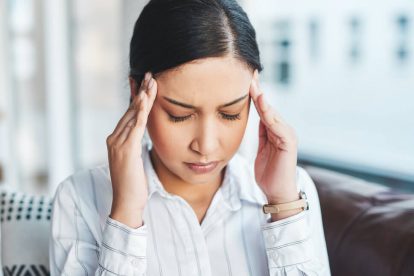From Anxiety Disorder to Substance Abuse: Co-Occurring Benzodiazepine Addiction

Too often, the story of seeking treatment for anxiety becomes a story of addiction due to the sustained use of benzodiazepines. By exploring the origins of benzodiazepine addiction, you can more fully understand this phenomenon, including the necessity of healing from anxiety and co-occurring benzodiazepine addiction simultaneously.
“The first step to recovery is admitting you have a problem.”
Adages can be comforting—this one particularly so. It suggests a world in which identifying a problem opens up a clear path to healing, and that the biggest barrier standing in the way of recovery is simple denial. And, sometimes, that is true.
But for a growing number of people with anxiety disorders, admitting that you are struggling brings you closer to another and equally damaging condition: co-occurring benzodiazepine addiction.
A Story of Anxiety and Addiction
Sophie Saint Thomas admitted her anxiety disorder after experiencing a panic attack and she did what you’re supposed to do: she sought treatment. Part of that treatment came in the form of Ativan, a fast-acting benzodiazepine commonly prescribed for all forms of anxiety disorders. At first it worked; it gave her the tranquility she had been searching for, staving off the panic that had previously overtaken her and left her fearing for her life. But soon her daily 1mg dose of Ativan “had evolved into 4mg of Klonopin a day,” and she felt utterly helpless without those little round pills. It all came to a head when one night, during dinner with her father, she realized she had forgotten her Klonopin at home. “The withdrawal symptoms kicked in. Symptoms resembling a heart attack started, and I was unable to speak,” she writes in a moving essay for The Fix.
My hands went numb and I stuttered as I could not breathe. It was obvious something was happening, I was starting to cry out of panic and humiliation. I explained to my father what was happening, and we wrapped up dinner. He hugged me tight and hailed me a cab I took home to Brooklyn and took my second pill. A tidal wave of relief came over me, I felt like myself again.
Although by then she had been dependent for years, it was only that night that she realized what her relationship with her medication had become. Benzodiazepine addiction, she learned, can be hard to see. “Recognizing you have an addiction to a chemical is much easier when purchasing it requires stepping outside, looking both ways for signs of police, and sketchily exchanging cash for a baggie of white powder on a dark street corner,” she says. “It’s a lot harder to recognize when the drugs you are addicted to are prescribed by a kind doctor in a clean office and given to you in stamped pills from a smiling pharmacist in a prescription bottle with official instructions.”
The Origins of Benzodiazepine Addiction
Benzodiazepines aren’t new; by the time Mother’s Little Helper, the Rolling Stones’ ode to Valium, came out in 1966, benzodiazepines had already been around for more than half a decade. Over the years, growing public willingness to seek treatment for anxiety has coalesced with decreasing stigma surrounding psychopharmacology and the release of new formulations to make benzodiazepines the most commonly prescribed psychoactive medications in the world. By 2010, over 50 million prescriptions for Xanax alone were written in the United States each year. In some ways, this is good; people are admitting they need help, and benzodiazepines can be a part of providing that help, particularly if used as a short-term intervention.
However, benzodiazepines also carry a significant addiction risk, especially when used as a long-term solution for anxiety. As McGill University’s The Brain from Top to Bottom series explains, “Like alcohol, these drugs increase the efficiency of synaptic transmission of the neurotransmitter GABA by acting on its receptors.” This modified GABA activity is what creates the sedative, anxiolytic effects anxiety sufferers are seeking as well as those that make them attractive to recreational users. With sustained exposure, however, your brain adapts to the artificial modulation provided by benzodiazepines, becoming dependent on these drugs to maintain a state of equilibrium—regardless of whether you have an anxiety disorder or not.
Without the presence of benzodiazepines, you begin to experience withdrawal symptoms such as agitation, anxiety, depression, and other mood disturbances, which you may try to alleviate by taking increasing doses of the drug, out of the mistaken belief that your original condition is worsening, rather than recognizing that you are experiencing withdrawal. In addition to chemical dependency, you can experience deep psychological addiction, relying on these drugs emotionally beyond that warranted by your condition. While physical dependence takes time to develop, psychological dependence can take hold at any point.
The dependence-forming nature of benzodiazepines explains why addiction for these drugs has more than tripled since 1998. But along with rising addiction rates has come increased awareness regarding the dangers of these drugs in the treatment of anxiety, leading many doctors to implement more strict prescription policies that focus on short-term use and/or selecting longer-acting versions that carry less risk of sparking co-occurring benzodiazepine addiction. The mood has transformed from one in which benzodiazepines are considered a first-line option to one in which their use must be carefully considered and monitored within a more comprehensive treatment plan—a change that will hopefully stem the tide of co-occurring addiction in the future.
Healing from Anxiety and Co-Occurring Benzodiazepine Addiction
If you are struggling with anxiety and co-occurring benzodiazepine addiction, treatment can be a scary concept. You already sought out care for your anxiety disorder, and the results were less than desirable. You may also believe that your continued use of benzodiazepines, however problematic, is preferable to returning to a place of overwhelming anxiety. But you do not have to choose between debilitating anxiety and addiction; you can choose recovery.
For many people who have become addicted to benzodiazepines as the result of anxiety disorder treatment, a residential mental health program offers the best environment in which to begin the healing journey. In this setting, you can safely taper off of your current benzodiazepines in a supervised, supportive environmentand, if necessary, rapidly transition to a more appropriate, non-addictive medication, such as an SSRI. Getting off benzodiazepines, however, is only the first step; in order to truly heal from anxiety and addiction, medication cannot be your only path forward.
Residential programs take you away from the stressors of everyday life and allow you to fully immerse yourself in the recovery process through a comprehensive range of interventions designed for your unique, complex needs. Via intensive individual and group therapies, you can uncover the roots of your anxiety and come to understand the barriers standing in the way of healing. By combining this insight with practical coping skills, you are able to break free from the hold both your anxiety and your benzodiazepine addiction have on you and replace destructive thoughts, emotions, and behaviors with healthy alternatives.
For people with anxiety disorders, Cognitive Behavioral Therapy is often the centerpiece of this process. However, holistic therapies such as yoga, meditation, massage, exercise, and acupuncture can be just as vital to treatment as psychotherapeutic modalities, as can simple lifestyle changes like eating a healthy diet. By engaging your mind and body in new, productive ways, you will enhance your ability to cope with feelings of anxiety and unlock your own ability to heal yourself.
Developing a benzodiazepine addiction as the result of anxiety treatment can be devastating and your trust in the mental health community may be damaged. But by seeking out the care of compassionate clinicians with experience treating anxiety alongside your substance addiction, you can regain control over your life and move forward with renewed purpose. As Sophie says, “There is no shame in seeking help for any mental illness, be it going to the doctor when you first recognize you need help, or six years later realizing you fell too far down the pill-popping path and now need a doctor’s help in getting off them.”
Bridges to Recovery offers comprehensive residential treatment for people struggling with mental health disorders as well as co-occurring substance abuse and eating disorders. Contact us to learn more about our innovative program and how we can help you or your loved one start on the path to healing.
Image Source: Unsplash user Joshua Earle






